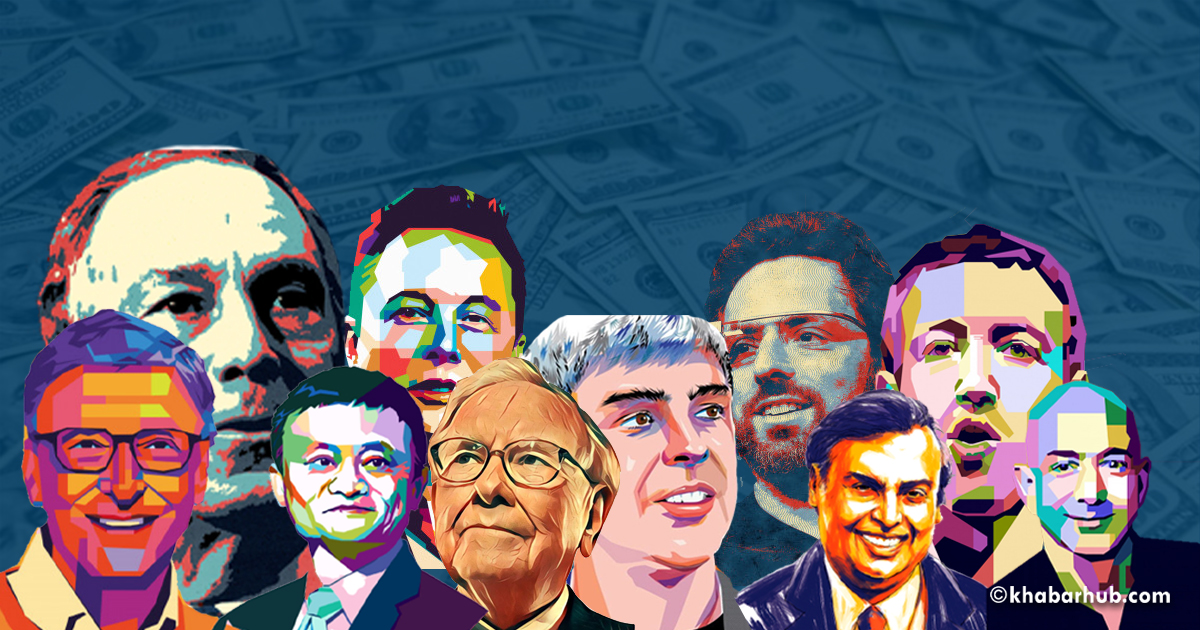A long time ago far into the year 1982, Forbes curated the first-ever edition of the 400 richest Americans — also known as ‘Forbes 400’.
Five years down the line the magazine was on its way to expand the rankings into ‘World’s Billionaires’, with 140 billionaires from around the globe making it into the list.
Today these billionaires have become bread and butter of the modern media scene, vis-à-vis business and philanthropy, drawing headlines much in the political, social, environmental and economic realm.
Two months back Amazon’s Founder Jeff Bezos decided to pump more than USD 10 billion for climate science which was perceived as mind-boggling and received an avalanche of attention.
Many applauded Chinese billionaire Jack Ma’s decision to donate essential supplies in South and Southeast Asia amidst the COVID-19 Pandemic, similar to which was the Silicon Valley billionaire’s initiatives to aid vaccine and disease research.
In the ever-changing landscape of the 21st century where authority (government institutions) has lost much of its relative power, such non-state actors’ influences are on the rise.
The field of international relations thus has increasingly viewed these super-rich individuals as one of the imperative forms of the non-state actors with their affiliations to NGO and IGO’s which is making a way for Philanthro-Capitalism.
Billionaires: Modern Day Messiah, our savior during global problems?
The question of billionaires being the “Modern-day Messiahs” is a sticky one, and has received grave attention today, amidst an excess of media releases and stories closely monitoring their response to the current pandemic through a ‘Billionaire Tracker’. Instances as such reinforce the lingering questions about the world’s reliance on their generosity.
In the ever-changing landscape of the 21st century where authority (government institutions) has lost much of its relative power, such non-state actors’ influences are on the rise.
Shifting global society, politics, and economics have boosted the power the ultra-rich hold; the power that recognizes no regional or national boundaries.
Due to international persistence, the ideas and solutions provided by these non-sovereign entities are often sought in conclaves and conferences across the world.
These booming numbers of billionaires partly sustain the world today with a swelling number of foundations and campaigns.
Such intractable problems, according to one of the many strident critics of billionaires, Ananda Ghiridhara, are typically instigated by the billionaires themselves, with the solutions that, although may seem enlightening at first, often come with strings attached.
Booming Billionaires
When we live in a world where 1 percent of the entire population owns half its wealth, the fact that we are witnessing the highest numbers of billionaires in human history is hardly intriguing.
The Gilded Age (1972- 1978), an era of emerging self-made billionaires in America particularly introduced us to what we in the present-day know as ‘Philanthropy’.
Promoted by one of the famous billionaires of the era, Andrew Carnegie, the ‘Gospel of Wealth’ was the first recorded philanthropic initiative guided by the belief that those who profited off of the society owed something in return.
Decades after, with Philanthro-capitalism on the rise (especially after the establishment of the Bill and Melina Gates Foundation), writers like David Callahan talk about the emergence of ‘New Gilded Age of Philanthropy’.
Last month, ‘2020 Forbes World’s Billionaires’ introduced us with 2,095 recorded billionaires owning more wealth than 4.6 billion people, amounting to a total of almost 8 trillion dollars.
These booming numbers of billionaires partly sustain the world today with a swelling number of foundations and campaigns.
It is not to claim that the benevolence of the worlds well-heeled is not required but their contribution is solely to be perceived in terms of the capital.
Candid, an organization for making philanthropy transparent, estimates that USD 1.9 billion have been spent on the current pandemic relief by private entities worldwide.
In response, Ananda Ghiridhara, author of the book ‘Winners Take All”, commented that although gifts are welcome in such an emergency, one must continue to ask questions about how we grew so dependent on them in the first place.
Pursuit of Power and Portrayal
Billionaires making initiatives and doing things that the government usually does, has undeniably served power to them; a power that has evolved over the decades.
Individual billionaires exercise influence (money, moral authority, expertise) on both, the national and the international levels.
The report analysis by the Oxfam states that the widespread tax fudging is done by the largest MNCs run by ultra-riches, which has caused developing countries to lose USD 100 billion annually.
While the income of these chief executives shoots up every year, the wage rates of ordinary workers have hardly improved. In a typical situation, a billionaire CEO of an Indian corporation makes 416 times the income of the employee.
Similarly, annual share dividends from Zara’s parent company to Amancio Ortega is 8,000 times the annual wage of its factory workers.
Such companies that have been lining the pockets of these elites, and are scrutinized by Political scientists like Rob Reich, co-director of Stanford’s Centre on Philanthropy and Civil Society, for instigating more harm than good in the communities and nations, which requires more inspection than gratitude.
As per Reich, the continuity to this may as well lead to the reemergence of a benevolent aristocracy.
Paradoxically, while billionaires (soon to be a trillionaire) like the Amazon founder and CEO Jeff Bezos are hailed as heroes for their charities in response to the COVID-19, and at the same time, their companies are ending overtime pay for the warehouse and delivery workers on the frontline.
Much active, The Bill and Melinda Gates Foundation is also facing accusations for sidelining the health experts and tending to determine health policies.
The bearing of the elites whose companies have been benefiting from the tax evasion, political protection, manipulation, cheap resources, and cheap labor, on the stride towards assuaging the world problems altogether is an irony in itself.
The diversified existence of billionaires offers for us to see the shifting face of global power, and this budding dependency on a wealthy few, which is quite a matter of debate.
“Enigmatic Puzzle”
Nevertheless, the help coming from such actors cannot be accredited as minor in the fight against the world’s pressing issues, be it HIV/AIDS, Ebola, Polio, Poverty, Sanitation, etc.
When it comes to the current pandemic, billionaires projected role is a part of a bigger puzzle; the world especially developing nations whose governments are dwindling to meet even the most basic needs does require the offered capitals and materials during a crisis.
The philanthropy campaigns directed by such non-state actors can often move far more swiftly and malleably than the state’s government, however, all they are is to fill in the void but not substitute.
Philanthropy often can support a cause that does not yet have wide public support, which otherwise would have been required for any government to spur action providing a potential bridge between government and its people.
It is not to claim that the benevolence of the worlds well-heeled is not required but their contribution is solely to be perceived in terms of the capital.
In this new ‘Gilded Age’, these mega-billionaires holds much power than one can imagine, where their capital contributions very well might have and will save lives.
But such donations, in some form, reflect ‘private power’. It is the widening gap and the massive accumulation of wealth that has left many with little and few with many, which is also the reason why we have to rely on the latter, and why the equitable distribution of wealth in an economy is urgently needed.
These categories of non-state actors are expected to take on a larger share of accountability for the world problem after the state.
While many fear that it might challenge the role of a government, in a condition where people are dying every minute, these two actors need to harmonize, because ‘What better choice do we have?”.
The critique is not of the favors but of the dynamics; of an extremely alarming system that puts faith in billionaires whenever faced with an emergency.
Thus, the world problems are not only to be dictated by the whims of the rich but, the assurance of the government’s ability to justly safeguard the well-being of its citizens is vital. If not, we might just end up looking for messiahs to salvage us every time a crisis befalls.
(The writer is Research Associate at NIICE)
(Nepal Institute for International Cooperation and Engagement (NIICE), Nepal’s independent think tank, and Khabarhub — Nepal’s popular news portal — have joined hands to disseminate NIICE research articles from Nepal)








Comment